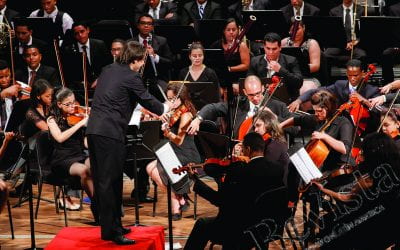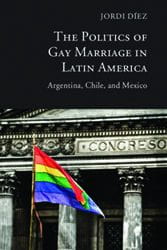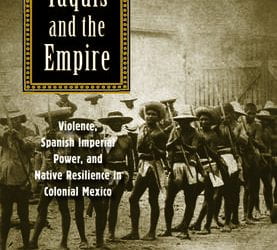Mauricio Kagel and Electroacoustic Music
Tango Alemán
When Mauricio Kagel returned to his native Buenos Aires in 2006, 111 cyclists greeted the avant-garde composer by performing his theatrical composition, “Eine Brise.” The festival in his honor, organized by the historic Teatro Colón, celebrated his decades as a pioneer in experimental music that often borrows from theatre, cinema and site-specific art. It had been years since Kagel – a longtime resident of Germany – had visited Argentina, and the festival was thus an opportunity to reclaim the composer for Argentina’s legacy and for a younger generation of musicians.
Kagel’s biography mirrors the multilingual and cosmopolitan nature of his compositions, shaped early on by his studies with another Argentine who understood the vexed nature of tradition: Jorge Luis Borges. Born to Jewish immigrants who fled anti-Semitism in Russia in the 1920s, Kagel developed as a composer in the experimental music circles of Buenos Aires, staging his first compositions, such as a multimedia installation called “Música para la torre,” in the 1950s. Shortly afterward, he moved to Germany where he resided until his death in 2008.
Particularly striking is the theatricality of many of his compositions, such as “Sur Scene” (1959-60). The work begins as a lecture on the crisis of modern music and progressively devolves into nonsense and ellipses as its words turn to rhythm and are taken over by the accompaniment of musicians and a mime, parodying not only the intellectual establishment but also the inadequacy of language itself. Despite his exile, South America comes up in both his investigations of language and his focus on the influence of musical tradition, in such works as “Tango Alemán” (1978). He would later explain it in an interview with Anthony Coleman, “I was born in Argentina, and tangos and vernacular music are for me what American music, jazz, is for you. In America you can never forget that jazz exists.”
And yet in much of his work, national identity seems to take a back seat to the Cage-influenced explorations of the outer limits of musical performance. His national origins seem perhaps most in line with his interest in the aesthetics of chance, as when he tells Max Nyffeler, “I was born in Buenos Aires, but it could just as well have been Chicago, Shanghai or Milan. Emigrants often travel, not to where they want to go, but where they can get a visa to go. The geography of chance is tolerable but unfathomable. I am Argentinian by birth, but in no way a typical citizen of that country. Or perhaps I am?”
An investigation into Kagel’s trajectory also helps to explore the limits of the national when it comes to contemporary music. What does it mean to look for the new, to cast off or parody tradition, to examine the limits between sound, language and sense? Does electroacoustic music have a nationality, or is there a rejection of the national that comes with these sonic explorations? Is Kagel’s move to Germany an example of “brain drain” (or rather, “creative drain”), influenced by his early inability to develop an electroacoustic music studio in Peronist-controlled Buenos Aires? Or are Kagel’s contributions to contemporary music a product of his formative years at the intersection of economic, linguistic, and musical traditions unique to the reality of urban, postwar Latin America?
The seeds of a different approach to nationality might be found in the work of Jorge Luis Borges in “The Argentine Writer and Tradition,” an essay published just a few years before Kagel left for Germany. Famously arguing that Argentine writers need not be bound by national topics, Borges wrote: “we cannot confine ourselves to what is Argentine in order to be Argentine because either it is our inevitable destiny to be Argentine, in which case we will be Argentine whatever we do, or being Argentine is a mere affectation, a mask” (427). Kagel took cues from this cosmopolitan perspective and the freedom it allowed him, as an outsider, to mount a critique of the established codes of musical conduct. While Borges reimagined his own literary canon through this cosmopolitan lens and satirized academic modes of truth, for his part, Kagel transgressed the very genre of musical production, viewing composition “as a means of intellectual inquiry” that was not to be limited to the sonic (Quoted in Heile 3).
Nowhere is this approach more apparent than in Kagel’s “instrumental theater,” a term he used to identify compositions that showcased musical performance as a sensory drama reminiscent of the theater. At its most basic level, instrumental theater investigates the tactile nature of playing, highlighting performers’ unique relationship with the instrument, which is consolidated in the pleasure of touch itself. In Sonant (1960), his first composition in this vein, musicians receive not only musical notations but also directions about how to play that are choreographed in sequences of gestures. In one movement, the musicians must practice a difficult piece without making a sound. Another movement has no musical notation at all, instead containing a series of instructions about how to imitate the other performers. “Music has also been a scenic event for a long time,” Kagel explains. “What I want is to bring the audience back to an enjoyment of music with all senses” (Quoted in Craenen 57).
Yet beyond its exploration of the senses, “instrumental theater” is also an affront to classical music that tends to conceal the composer’s communication with performers. Instead, Kagel’s compositions highlight the many layers of contact that characterize musical creation. The scores, for instance, are peppered with ironic cues that take on a performative quality when brought to stage. A particularly witty gesture appears in his instructions to the bassist in Sonant. In a parenthesis, he first cites Satie’s instructions in ‘Heures Séculaires’ in all capital letters:
“TO WHOM IT MAY CONCERN, I ABSOLUTELY FORBID THE READING OUT LOUD OF A TEXT DURING A MUSICAL PERFORMANCE. ANY INFRINGEMENT OF THIS RULE WILL BRING DOWN MY JUST INDIGNATION UPON THE WRONGDOER. THERE WILL BE NO EXCEPTION FOR REASONS OF FAVORITISM.”
Kagel then proceeds: “Quite to the contrary, my worthy bassist, I beg you to read this invitation out loud as you play” (Cited in Craenen 56). As a performed script, this indication reminds us that musicians relate to the composer through textual languages, some of which reach the audience, and some of which are kept private. This particular instruction also allows the composer’s literary voice to shine through as he savors the clever language of his predecessors and allows it to reach the stage. At the same time, this language demonstrates an inherent paradox in musical composition itself, which both represents what the composer intends, but will also always diverge from that intention.
Kagel did not stop at the relationship between musician and instrument, or between musician and composer; he also exploded tropes in the Western Classical tradition by staging the critical response that often upholds those regimens. For instance, the aforementioned Sur Scène stages multiple layers of reception, starting with the mime’s position as an eerie double of the audience. Upon walking on stage he “spends the time before the Speaker’s entrance reading the program” and then holds it in front of his face so that “only his smiling mouth is visible”. As the Speaker – who we assume is a scholar of some sort – begins to analyze the current state of classical music, the mime feigns careful listening in precise gestures, reminding the audience of their own bodies. Meanwhile, the musicians sometimes play along with the speaker, sometimes “look searchingly at the ceiling,” and occasionally play in unison with pre-recorded instruments, making their presence seem almost superfluous.
On the one hand, the Speaker’s words, like the piece itself, are disorienting and appear to be academic gibberish. But on the other hand, we also hear resonances of Kagel’s larger concerns regarding the alienation and crisis endemic to contemporary music. Near the beginning, for instance, the Speaker proclaims:
“The crisis which today has befallen the musical situation must be viewed, for the time being, as an ultimate consequence of alienation and selfhood … in which musicians [short pause] after all we cannot, with this never-ending talk about a crisis, lay bare all the problematic constituents of its problematic essence and simply bypass them …”.
While clearly a satirical and confusing criticism of academic analysis – the “clichés continually being produced by the world of music” as Kagel describes (Cited in Attinello 272) – the script also performs and provokes those very experiences of alienation and crisis in the audience.
These multiple layers of meaning position Kagel’s work as an important investigation into the way that language works as a series of performative circuits, moving between production and reception. What Kagel terms “the meaning of the text – semantic adaptation” takes a back seat to his investigations of the “utter ambiguity of role behaviour and the universe of discourse” (Cited in the liner notes from LP). These insights – as relevant to composers as to literary theorists – perhaps emerge from his perspective as an outsider in his adopted Germany and even his native Argentina, an artist who, like Borges, was constantly moving between languages and cultures. Or perhaps his compositions reflect Kagel’s own placelessness, performing a critique of classical categories and restaging music as a process of dynamic inquiry.
Winter 2016, Volume XV, Number 2
Anna White–Nockleby is a Harvard Ph.D. student in the Romance Languages and Literatures Department and a Teaching Fellow in Spanish.
Related Articles
When Music Changes Lives
English + Español
n 2004, I got a surprising phone call from Santo Domingo on one cold winter night. I was then studying musical composition in Strasbourg, France, a great opportunity for a young Dominican…
The Politics of Gay Marriage in Latin America
Despite its recent successes, the gay rights movement in Latin America is generally ignored in discussions of contemporary Latin American politics. Even students of Latin American social…
The Yaquis and the Empire
Winner of the 2015 Latin American Studies Association Social Science Book Award and runner-up for the 2015 David J. Weber-Clements Prize of the Western History Association, The Yaquis…




